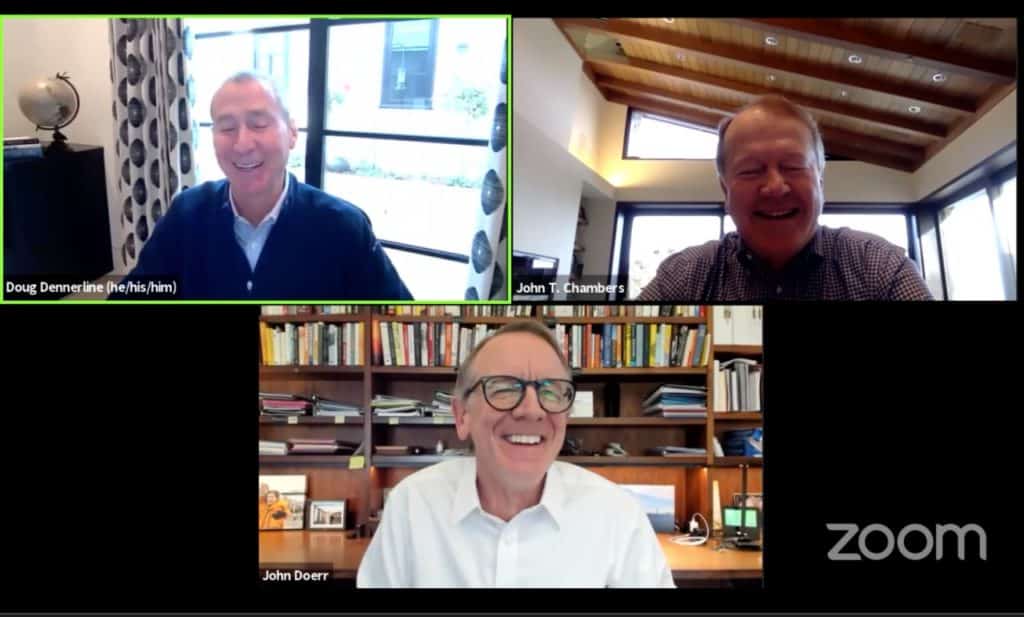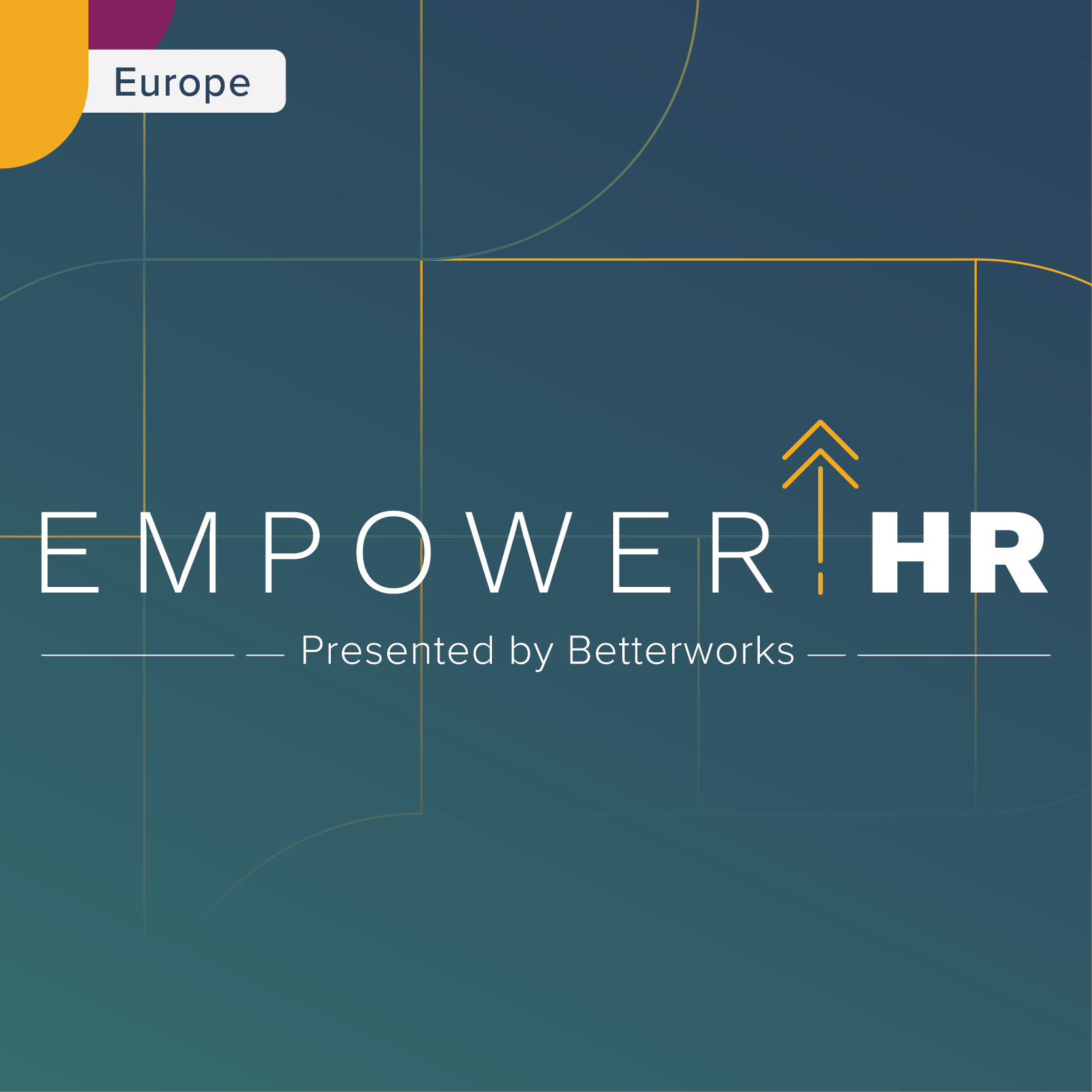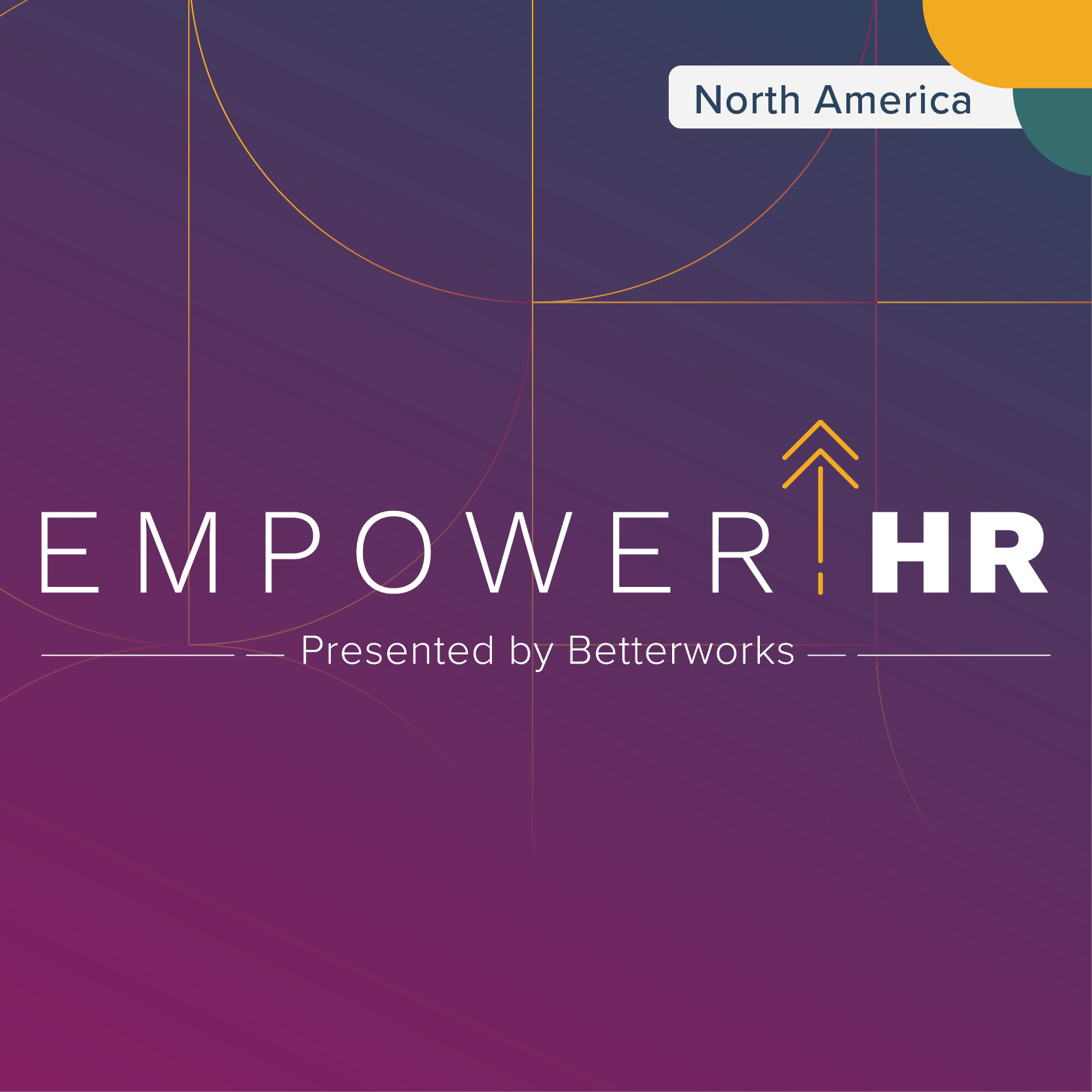Doug Dennerline, CEO of Betterworks, facilitated a conversation between John Doerr, Chairman of Kleiner Perkins, and John Chambers, CEO of JC2 Ventures, for Betterworks 2020 Goal Summit event. The session, titled Bring Strategy, Execution, and People Together to Improve Operational Results and Accelerate Growth, focused on the insights and experiences working through change, being a leader during a crisis, and the importance of company culture.

Doug Dennerline: Aligning strategy, the execution of that strategy, and the people within a company is the game changer when it comes to growth, agility, and resilience. Traditional performance management processes aren’t designed to address the needs of workers and leaders today.
A progressive CEO knows the importance of people and cultivating a culture that allows those individual contributors to thrive. They know to pair up with an HR leader to put processes in place that maximize understanding the top-level goals and strategy of an organization and communicating that strategy to everyone in the company.
When this happens, teams can align their own work and execute with clarity. When that happens, goals are achieved by the company that couldn’t have been otherwise. That’s the power of OKRs, key results, continuous feedback, and recognition which is what Betterworks specializes in.
We’ll be discussing how strategy and alignment work, and we’re also talking about leadership—especially during this unprecedented time where many of us are trying to lead and work from home. How is this crisis similar to what you’ve seen before and how has it been different?
John Chambers: This is my sixth financial crisis and my fifth pandemic, although clearly the COVID-19 pandemic is the toughest one. It’s my third supply chain crisis and in terms of the environmental crisis, it’s ongoing and it’s scaling.
This crisis is similar in many ways in terms of how you deal with the crisis in general. You want to see how much was created by the crisis in terms of your business challenges and how much was self inflicted. You have to look at those together. Then, you develop your 3-5 plays that you make off of that with your customers, your employees, your investors, the media, etc. You paint the picture of your north star and articulate how you’re going to come out of this. Next, is execution—you operate under the assumption that the crisis will last longer and be deeper than you think.
In March, I said on CNBC that this is going to be a real problem for a minimum of 3-4 quarters in the market. They said, “John, you’re a pessimist—that’s out of character for you!” And I said, “No, I’m being a realistic optimist. This is going to be tough for us.” And it has been.
How it’s different is that it’s four crises occurring at the same time. We’ve never seen that. Dealing with this kind of issue requires agility and speed that we haven’t seen before. In the dot-com bubble in 2000-01, 50% of venture-backed technology startups went out of business. During the great recession of 2008, 30% of venture capital backed startups went out of business. What surprised me was this time around. If you would have asked me, I would have said the number of tech companies to go under would be around 40%. The number, though ,looks like it’s going to be around 10% and that was a very pleasant surprise. This is because technology has played a role like never before.
Dennerline: When I was at Cisco with John Chambers he wanted to acquire a SaaS company. And we acquired Webex in 8 days. When I started to head up the Webex asset inside of Cisco, I thought, “Why would anyone get on an airplane when they can use Cisco telepresence and use Webex to do meeting and sharing and video?” And I was kind of surprised that the world didn’t take to it. We still climbed on planes—we were doing what was incredibly inefficient. Well it took a pandemic, John, to show the world how powerful these technologies we acquired way back when could actually be. And thank goodness for things like zoom because it showed the world how efficient we can be with this technology.
John Doerr, we’re here at Goal Summit and I consider you the “son OKRs” having worked for Andy Grove the sort of “father of OKRs.” You’re passionate about this and you’ve seen the impact of OKrs and CFRs on a lot of the portfolio companies that you’ve worked with. Can you tell us your overall journey with OKRs?
John Doerr: My journey began as a summer student at Intel in the very early days. They had just invented the microprocessor and Andy Grove opened up the first ever ‘Intel University.’ He called it IOPEC for “Intel’s Organization Philosophy and Economics.” He taught most of the courses himself. Andy had a really compelling lecture on how we get thousands of engineers and workers at Intel all focused, aligned, and committed. How do we track their progress and encourage them to stretch for nearly amazing things?
He made clear the facts of what was necessary: focus, alignment, commitment, tracking, and stretching. Those are the payoffs, the benefits of this. This type of communication and process is so important in the semiconductor industry because thousands of people have got to get lines that are one micron-wide exactly right or else nothing works at all.
We describe the culture at Intel as a bunch of aggressive introverts who want to have a meritocracy where the best ideas would be on the table. Where you could confront problems without confronting people. We did that and as a result, we moved faster. My book, Measure What Matters tells a dozen stories about Andy Grove’s OKRs—objectives and key results. It’s a powerful tool and i’ve always believed that if you set your goals clearly, transparently and collaboratively that you’re much more likely to achieve them.
So in these uncertain times where knowledge workers need to know what’s going on, and need to feel engaged, there is no more powerful tool than to use a system like this together with video technologies. It’s not a substitute for great management, it’s not a silver bullet, but I believe it’s an essential way to achieve operational excellence.
Dennerline: John Chambers, I’ve always loved the saying you have, which is, “You find out who your real leaders are during a crisis.” I’ve watched you manage through a lot of crises at Cisco. Do you have any advice for people who are dealing with their first one? What should they be thinking about and doing?
Chambers: I think many of the companies at this session are tech companies and managing through a crisis is a replicable process. For those going through this for the first time, it’s important that leaders, regardless if you’re the leader of the company, one of the founders, or an individual contributor in the company, to know what you know and know what you don’t. That’s one of the things that gets a lot of people into trouble. They try to think that because they’re a really good engineer they know how to deal with sales or they know how to deal with a crisis. And that’s usually not the case at all. This is where I think the valley has been so strong with VCs such as John Doerr and others that are more of a business partner than an investor who is helping you manage through it.
Another thing I’ve learned is to understand that dealing with a crisis will be unpleasant. Leadership is really lonely. I never understood that. Shimon Perez, the President of Israel said to me, “John, leadership is lonely.” I said, “Shimon, I got 40,000 people around me.” He said, “No, John. When it gets tough you will be by yourself.” And he was right. It was brutal. I can’t tell you the pain that you go through. You’re trying to make the right decisions and you need to know that’s also going to occur.
But the key is life is full of replicable patterns. A leader needs to watch those patterns and ask themselves, “How do we adjust?” It’s how you manage through your setbacks and your crisis, even if you inflicted them yourself, that determines who you are as a company. As Jack Welch taught me, you’re never going to have a great company until you’ve had a major setback. At Cisco, we went from one of the most valuable companies in the world—where we won every award there was to win on corporate responsibility and CEO leadership— to people like Jim Cramer asking if I should even run Cisco. It was very humbling. But Jack called me up at the end of that year and said, “You’ve had the best year you’ve ever had.” And I said, “Well, it doesn’t feel like it. People are losing confidence in me including some of the employees, the market has been brutal on me, I feel like I let people down.” He said, “No. This was your best year because you navigated through this and the majority of your peers did not.”
The last piece of advice I would give is to tell stories. I tend to be very analytic: here are the 10 things you need to do for a great acquisition or manage through a crisis. People won’t remember those one month later. If you tell a story behind your strategies, people remember those stories and then put them into action.
Dennerline: John I’ve seen storytelling work in Cisco. Cisco went from 14,000 people when I started in 1998 to 48,000 people in two years. I opened up a class every monday at Cisco for 1,200 new hires. Our whole deal was that we spent 8 hours with these new hires and all we did was tell stories. And it kept the culture together in an amazing way.
Chambers: You’ve just hit on a key element that John Doerr and I both agree on. We think about strategy for leaders, the strategy and vision of their company, building the leadership team to implement that strategy and vision, communication—but what is often underestimated is culture. You can never have a strong company without a strong culture.
People underestimate the importance of a strong culture. The reason we had 5% voluntary turnover in an industry that averaged 15% was all culture. The reason our acquired companies only had 4% turnover after we acquired them in an industry that averages 25% was all about culture. And that’s one of the other things I want to point out. Do you really think about and articulate the culture of your company well? Understanding your company’s culture may be more important in terms of getting through the crisis than your actual strategy.
Dennerline: John Doerr, you’ve seen so many incredible companies in your career. Could you maybe give an example of one that you’re proud of in terms of their use of OKRs and their journey using them?
Doerr: I want to build on this idea of culture and I realize we haven’t defined OKRs. The “O” or “objective” is what you want to have accomplished. The “KR” or “key result” is how we’re going to get it done. Culture answers the more fundamental question which is why we do the work we do. So: what, how, and why. Culture allows teams to make decisions and act quickly without referring to a kind of rule book. Culture is key.
One company that had an extraordinary culture almost from the beginning is Intuit company. Atticus Tysen who is the CIO of Intuit wanted to improve the coordination across his teams that were in three different corners of the world: India, Europe, and North America. He got on the internet to find out about goal setting. Lo and behold he learned about OKRs and learned about Betterworks and initially deployed that goal-setting system across a team of 1,200 developers in all different time zones. This is a company that famously won and wins awards as being a great place to work. Atticus used Betterworks within his team and the rest of the company took notice.
Today, something like 17,000 Intuit knowledge workers every quarter write down their objectives and key results and grade them. They post them transparently and yet they’re not used directly for bonuses or promotions. They serve a higher purpose, which is a social contract that above all else, they’re going to delight customers. It’s an integral part of their operation. Doug has seen that at Intuit. What would you add?
Dennerline: What the rest of the organization witnessed with Atticus’ leadership was people achieving things they weren’t able to achieve before and at incredible speed. The rest of the organization took notice and now Intuit uses Betterworks entire capability, which is around OKRs and quarterly conversations about how you’re doing against the achievement of those goals. Managers can ask, “What roadblocks are you hitting?” And, “How can i remove those roadblocks and help you achieve more?” They use us for feedback and recognition. So all 9,000 of the employees at Intuit today are deeply embedded with the Betterworks application. It’s great to see.
John Chambers, one of the things I’ve witnessed you do is see around corners. What’s around the corner for us considering what’s going on?
Chambers: I’ve had the chance to watch so many brilliant people in Silicon Valley. There’s only one Steve Jobs that just somehow knew how to build things. Most of us don’t have those skills. What I do is crowdsource constantly and listen constantly. I believe that everybody can add value regardless of their position.
At the core of that, I listen to the customers. In terms of acquisitions, once you’ve done the acquisition and you get to scale, you’ve got to ask, “What do you do next?” When you look at the patterns and figure out what you can repeat and then combine them with the lessons John Doerr talks about with the right culture and right strategy, that’s when you can disrupt markets.
Dennerline: I’ve watched you walk away from acquisitions because of culture.
Chambers: Yes. Very often people don’t understand what they’re acquiring when they’re acquiring a company. It sounds spacey- but they don’t. They’re making a financial decision.
Many years ago, when Nations bought Bank of America, what Hugh McColl was doing was not acquiring the people of Bank of America, he was acquiring customers and geography and he was very plain about that and he didn’t keep a lot of the leaders. In our industry, technology, you’re acquiring people and next-generation product. So in my opinion, the reason 90% of acquisitions fail in high tech, is they forget what they’re acquiring and then they don’t protect it.
That goes back to the turnover we talked about. When we acquired a company, if the culture wasn’t very similar, if we couldn’t keep the key founders and key engineers, we wouldnt acquire the company. Or if in the middle of negotiations and we realize there’s a cultural setback and we think somebody misled us, no matter how good the financial decision was, we would literally fold up our laptops and leave. A key element in the success of our acquisitions is I’ve never acquired a company that had a different culture.
That doesn’t mean their culture was right or wrong, but our culture was a more collaborative family-type culture focused on customers. That’s how we made our decisions. And if another company perhaps didn’t include their employees in shares in the company, we wouldnt acquire them either.
Doug: John Doerr, in your experience, how important is culture in your decision to invest?
Doerr: Culture is the most important decision. The thing I try to figure out first when I’m meeting an entrepreneur or a team is, “Would I mind getting into trouble with them?”
I remember when I first met Jeff Bezos he came bounding down from a loft with his big, honking kind of voice. Jeff took me around the Amazon distribution center which was in the back of this loft with some tables built out of Home Depot doors that were self assembled. I immediately formed the opinion from his optimism and enthusiasm and the way he related to his people that I wouldn’t mind getting into trouble with Jeff and we did. The company almost failed two or three times even after it went public.
I think culture matters more now than ever before. Here’s an excerpt from Dov Seidman’s book How. “In the past, employees just needed to do the next thing right—to follow the instructions and orders to the letter and culture didn’t matter so much. But now we’re living in a world where we’re asking people to do the next right thing. A rulebook can tell you what you can or can’t do but you need culture to tell you what you should do.”
Chambers: I cannot agree more. I’d say for leaders reading or listening to this, at your next staff meeting have everybody write down the answer to ‘what is our culture?’ It will surprise you. Some people will answer remarkably well and others will not. If you do it right, culture is easy to understand and very specific to what you do and don’t do. I would argue that every decision you make will be informed by your culture, if it’s articulated properly.
Interested in hearing the conversation yourself? Watch the recording of the Goal Summit Kickoff here.









